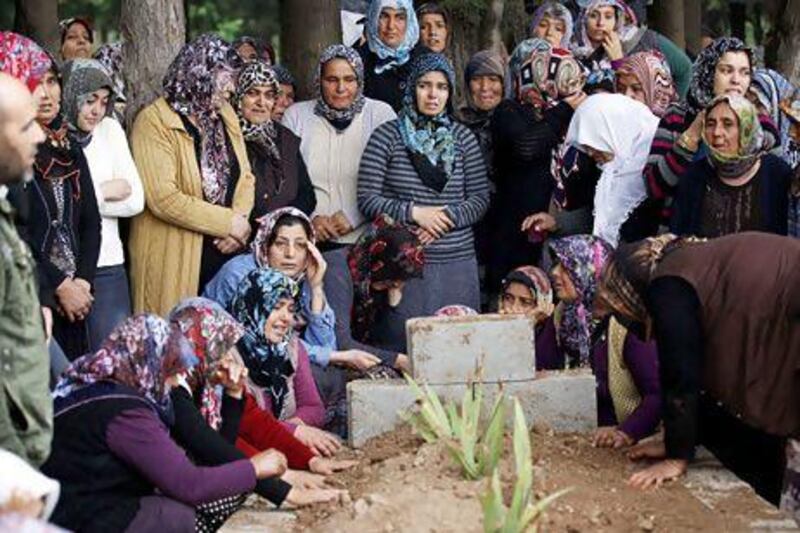ISTANBUL // The twin car bombing that killed 46 people in a Turkish town over the weekend raised fresh suspicions about the scope of Syrian regime spy activities in southern Turkey.
Turkey accused intelligence services from Bashar Al Assad's government of carrying out the bombing.
While Syria denied any involvement yesterday, there have been numerous allegations of Syrian regime agents operating in southern Turkey.
Most have been alleged attempts to kidnap Syrian opposition figures and defectors on Turkish soil and take them back across the border into Syria.
The 900-kilometre frontier between the two countries is criss-crossed with smugglers' trails and in some places heavily forested and mountainous, making it difficult for authorities to detect regime operatives infiltrating into Turkey.
With more than 300,000 Syrians having fled to Turkey since the uprising started, it would be easy for agents to enter the country posing as refugees.
Most refugees live in camps along the border, but they can also rent private accommodation in towns and villages and move freely. Turkish citizens have also been accused of working for the Syrian regime.
Turkey yesterday detained nine Turkish citizens in connection with the bombings and accused them of having links to the Al Assad government. Charges against them have not yet been announced.
In a separate case, a Turkish intelligence agent is awaiting trial for allegedly handing over a high-ranking Syrian military defector and another refugee to regime forces following their disappearance in October 2011. The agent, who worked for the Turkish National Intelligence Organisaton, along with four other individuals, is believed to have returned Colonel Hussein Harmoush and Mustafa Kassum to Syria for Dh367,000. The five were arrested in February 2012.
The kidnappings prompted fears among Syrian refugees that they were not safe.
In January, authorities in southern Turkey foiled another alleged kidnapping attempt, this time against Mousa Ahman, 31, a Syrian rebel fighter and lawyer.
Mr Ahman claims he was lured into a trap by a cousin, a Turkish citizen named Mursel Al Maz, who he said was working with regime agents in Turkey.
Mr Al Maz told Mr Ahman that he had met a Saudi businessman who wanted to support the Syrian opposition. He agreed to go with Mr Al Maz to a nearby town where he said the businessman was staying.
Along a dark stretch of motorway, Mr Al Maz stopped the car and three men approached with guns drawn. They tied and gagged Mr Ahman, putting him in the boot of their car. Mr Ahman insists his captors were from the Syrian intelligence.
They drove him to a forested area near the Yayladagi border crossing between Turkey and Syria but as they marched him up a hill towards the border they were intercepted by Turkish soldiers, who wounded at least one of the kidnappers in a gunfight. Mr Ahman was freed and his captors jailed. Mr Al Maz was later arrested at his home and remains in prison.
While Mr Ahman's account of his kidnapping couldn't be independently corroborated, the Associated Press reported in January that Turkish authorities detained three Syrians who were attempted to kidnap an opposition lawyer. Five Turkish citizens were also detained.
"They want to cause chaos and confusion in Turkey," said Mr Ahman referring to the Syrian intelligence services.
Mr Ahman believes Mr Al Maz may have been recruited after he was arrested and imprisoned in Syria in June 2011 on charges of spying for Turkey.
After 51 days in jail, the construction worker and father of five, was released due to lack of evidence, according to a September 2011 The Times of London article.
foreign.desk@thenational.ae
twitter: For breaking news from the Gulf, the Middle East and around the globe follow The National World. Follow us
Bombings raise fresh suspicions about scope of Syria's spy activities in Turkey
Turkey has accused intelligence services from Bashar Al Assad's government of carrying out the bombings that killed 46 people..

Editor's picks
More from the national




